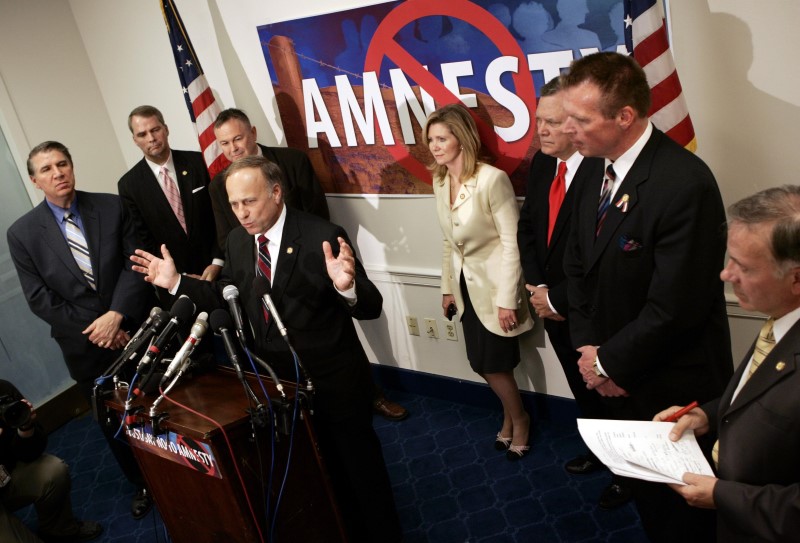By Richard Cowan
WASHINGTON (Reuters) - Prominently featured on Representative Steve King's congressional website are what he calls "illegal immigration stories" that tell of undocumented people, mainly Hispanics, wreaking havoc in America: killing, robbing, kidnapping, trafficking in sex and drugs.
As the face of the opposition to comprehensive immigration legislation in Congress, King has long used fiery rhetoric to argue for deporting all 12 million undocumented residents and fortifying U.S. borders.
Now, the Iowa congressman's high-profile role in the debate over President Barack Obama's executive order on immigration threatens Republican leaders' efforts to rebrand the party as more friendly to Hispanics, while his effort to block funding for the action raises the risk of a government shutdown.
King and Representative Michele Bachmann, a fellow Tea Party activist, plan a news conference on Wednesday to make their case that Obama has violated the U.S. Constitution by moving to shield 4.7 million undocumented residents from deportation if they have no serious criminal record.
Not stopping there, the 65-year-old, six-term lawmaker told Reuters he would like to push legislation through the House to "censure" Obama and top it off with a bill to block funding of the president's immigration initiative.
Doing anything less, he said, is "asking members of Congress to fund a lawless, unconstitutional act. It can't be tolerated."
Shutting off funds to implement the executive action could kill efforts to pass a government funding bill by a Dec. 11 deadline, forcing the second shutdown of federal agencies in 14 months.
House Speaker John Boehner and Senate Republican Leader Mitch McConnell, both eager to avoid budget theatrics following a politically disastrous 16-day government shutdown in October 2013, are working to tamp down such demands from the most conservative Republicans.
Boehner and McConnell also have an eye on the 2016 presidential elections and the Republican Party's goal, developed after its 2012 White House defeat, to lure Hispanic votes with a more inclusive message on immigration.
King has other ideas. In January he will host a "freedom summit" in Des Moines for some of his party's most conservative ideologues, including Texas Senator Ted Cruz and former Pennsylvania Senator Rick Santorum, to sketch out their visions for America if they were elected president in 2016.
"What's remarkable is that he (King) was marginalized, or seemed marginalized, following the 2012 election when Republican leaders and conservatives were lining up to pass immigration reform," said Frank Sharry, a leading immigration advocate as head of the group America's Voice.
Now, this "hardest of hard-liners," Sharry added, "is arguably the most influential man in the House Republican caucus" on immigration matters.
In the past two years, King repeatedly has stomped on Republican efforts to appeal to more Hispanics. He has urged Congress to take advantage of his construction business experience and build a concrete wall along the southern border with Mexico.
He also talked of illegal immigrant children with "calves the size of cantaloupes," because he said they were hauling marijuana under their pants as they crossed into the United States. That led Boehner to lash out at King, calling his comments offensive and not reflecting the values of the Republican Party.
In mid-2013, as Boehner vainly tried to lay the groundwork for a major immigration bill, King successfully pushed an amendment in the House to shut down Obama's 2012 initiative easing deportations against undocumented people brought to the United States as children by their parents.
But while King is a lightning rod for controversy, many of his fellow Republicans are comfortable with at least some of his policy positions, if not his style.
"To some extent, he and I see things similar in that I am a law-and-order guy," said Representative John Carter of Texas, a member of a bipartisan House group that for several years tried to cobble together a comprehensive immigration bill.
"And Steve is a true believer that we ought to follow the law," Carter said.
Dennis Goldford, a political science professor at Drake University in Des Moines, said Iowans encountered a cultural change by the end of the 1990s as meat packing plants and manufacturers employed large numbers of Hispanics in a state that, according to the Census Bureau, is still 92.5 percent white.
"Some of that was greeted with open arms, some was greeted with a certain amount of fear and uncertainty," Goldford said, adding, "King has ridden the fear and uncertainty," although not with racist intentions.
Craig Robinson, a former political director for the Republican Party in Iowa, praised King for being a consistent voice on immigration, although the language he uses "can make it easier for his opponents to make him appear to be one of these cold-hearted conservatives."

Sharry countered: "I can't look into his heart. But I'll say I'm not sure he has one."
(Editing by John Whitesides and Ken Wills)